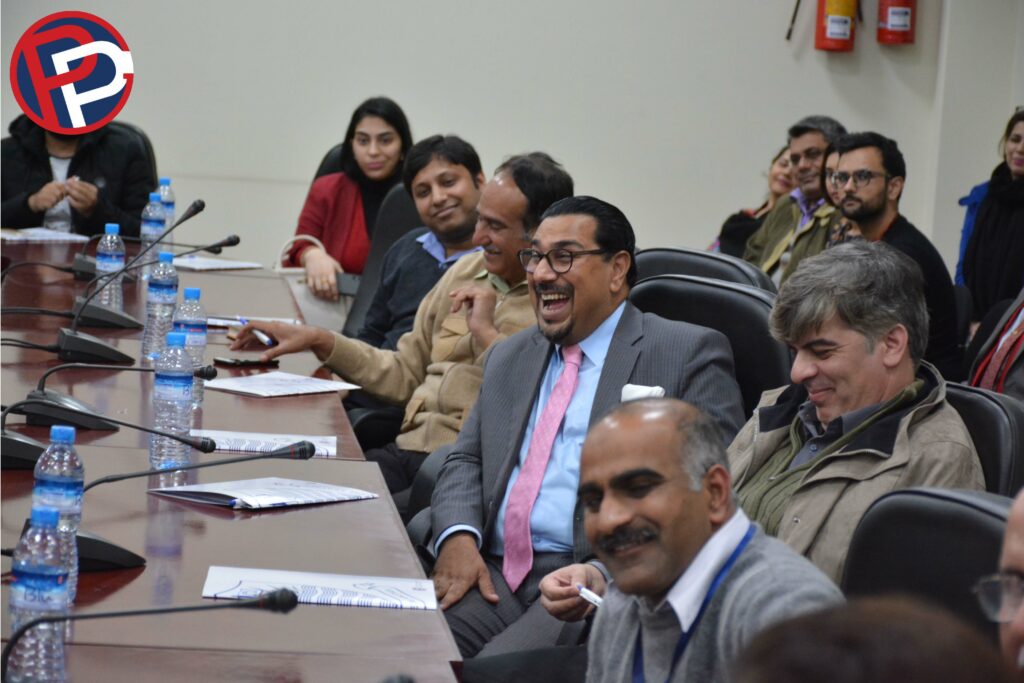
State of the Economy and the Desperate Need for Pro-poor Growth
Seminar
Past Event
On Thursday December 12th, CPPG invited Dr. Sohail Jehangir Malik for a talk on “The Current State of the Economy and the Need for Pro-Poor Growth”.
The seminar sought to address a number of concerns such as why merely macro-economic stabilization is not enough to address the rapidly deteriorating economic situation today, why the “same old, same old” policies to address the underlying causes do not work, the importance of good data, effective policy research, monitoring and evaluation, capacity building and implementation. The seminar also proposed an out of the box reform agenda that focuses on capitalizing on existing resources including incentivizing educated unemployed rural youth to be Social Entrepreneurs and agents of change.
He argued that the economy is severely constrained in its ability to manage socio-economic risks due to several pre-existing issues such as inequitable distribution of resources and power in terms of disparities that exist across people, genders, and regions. Some of these challenges include a rapidly growing population whereby the majority has little or no education, skills or access to productive resources; Widespread poverty and malnutrition across gender and regional dimensions; Debt management crisis, rampant energy crisis, looming water crisis, natural and man-made disasters such as War on Terror and earthquakes/floods.
This situation is exacerbated by poor governance and economic mismanagement in terms of rampant corruption and decayed institutional structures, rapid deterioration in ethical norms whereby there exists an elite capture of social justice, poor analysis, poor data, and diminished domestic capacity to design and implement reform, increasing reliance on donors, growing disconnects between the central and provincial governments, false bravado which focuses on slogan mongering, arrogance and denial taking precedence over reason and decency, almost non-existent results focused monitoring and evaluation, and inadequate / absent focus or capacity for change management. Decades of poor policies and implementations, absence of effective M&E, lack of accountability, distorted prices, exorbitant borrowing, lack of competitiveness, low productivity, elite capture, continued lack of opportunity, security and empowerment all result in suboptimal growth of the economy. Meanwhile our attitude consists of waiting for divine help, or seeking help from Saudis, Qataris, CPEC or the IMF.
For decades now the economic strategy of Pakistan has revolved around macroeconomic stability and policy choices, gains from globalization and demographic dividend which have failed to generate pro-poor growth and poverty reduction. The IMF program with its primary short term focus on macro-adjustment carries the huge risk of further inflation, reduced unemployment, and escalating poverty even further. The rural farm economy within which agriculture operates is also severely constrained by a host of problems such as lack of quality, information asymmetry, low human capital, inability to access markets, lack of access to finance and lack of competitiveness. On top of this is data presented to us that misinforms us because it is not triangulated and often leads to unrealistic conclusions. For instance our calculations of poverty levels are overoptimistic and do not account for phenomena such as malnutrition or purchasing power. Strange processes such as “backtracking” to determine economic trends are exercised by our public statisticians but this is unacceptable. He urged the students to critically examine economic statistics and demand data that is reliable.
According to Dr. Sohail we need to look at local solutions for improving our development. For instance given we are experiencing a youth bulge, a majority which are uneducated and unskilled, we can connect them to Higher Education Institutes through their skilled and educated compatriots. Students at HEIs across the country can act as interlocutors and agents of change where the HEI’s can help provide knowledge capacity building and connectivity and address information asymmetries. A network of social entrepreneurs can then be created whereby HEI’s connect to rural areas as well through their student body. These groups are linked across the districts of Pakistan whereby HEI’s provide the necessary business incubation needs while social entrepreneurs in turn commit to employing local inhabitants and use of local materials and markets, to fair business practices and to adopting one school, one BHU or one Mohallah etc. for their businesses. Such a program creates groups of entrepreneurs that are selected through advertised competition for a combination of innovative employment generating business ideas based on districts needs and niche comparative advantage and proposal for socially responsible activity that the group will commit to undertake. Dr. Sohail calls this proposal “Umeed, the Young Entrepreneurs Program”.
This initiative can facilitate cooperation and partnership between public and private sectors and access to key factors such as financing skills and markets, it can provide development to business incubators, financial mechanisms such as credit guarantees and other SME support systems. It links demand and supply and backward and advanced regions and provides quality assurance and business confidence. Umeed can ensure development of viable commercially sustainable business models, ongoing M&E to ensure replicability and scalability, capacity development, strengthening of backward and forward linkages, promotion of venture capital, social responsibility, self reliance, self respect and hope for the youth.







